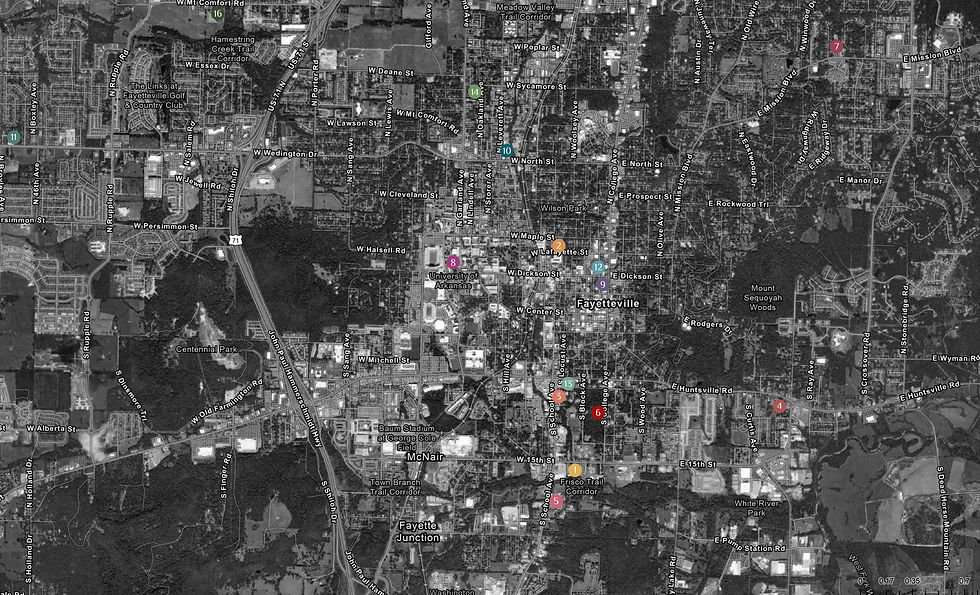Equality, Justice, and Inclusion
- cnlents
- Sep 28, 2022
- 3 min read
Fayetteville Arkansas was ranked the 7th best place to live in the U.S. by the U.S. News and World Report. They determined this based on data regarding the job market, value, quality of life, desirability, and net migration. But does this mean it’s best for everyone? What challenges do people in Fayetteville face the most? Based on research and my personal experience living here for the past 5 years, I think the greatest challenges lie in the high housing prices, access to healthcare, and transportation.
Housing Prices
The increasing demand for housing here has caused the prices to steadily rise over the past few years. This has caused more and more people to live in poor conditions, move out of the city center, get stuck renting instead of buying, or become homeless. At least 15% of households are overcrowded, expensive, lack kitchen facilities, or lack plumbing facilities. Moving to small surrounding towns is a viable option, but most people still work in Fayetteville so it causes much longer commute times. Only 53% of housing units are owner-occupied, while the average in Arkansas is 66%. These are just a few of the issues caused or at least related to the high housing prices.
Access to Healthcare
Providing access to healthcare has always been very important, but it has become even more so the past few years. Yet 14% of people in Fayetteville are uninsured. This is 3% higher than the average for Arkansas. I found this very surprising. Fayetteville is one of the most urban places in Arkansas with one of the highest median incomes so one would think that more people would have insurance and access to healthcare. 22% of people are in poor or fair health. 34% of adults are obese. 27% of adults participate in leisure time physical activity. All of these despite Fayetteville being known as a healthy and outdoorsy city.
Transportation
The public transportation systems in Fayetteville are extremely limited. The main public transportation isn’t even through the city, it's through the University of Arkansas: the razorback transit. The city is also not very walkable. It does not yet have sidewalks or trails throughout the city, but this is being developed with the Razorback Greenway. So with no actual public transportation and limited walkability what are people without cars supposed to do to get around? I have several friends without cars and they have to depend on other people to take them places or walk. During the week they do take the razorback transit, but this doesn’t go everywhere so they still end up relying on others or walking. Even for people that do have cars, the number of people commuting daily is so large that traffic gets insane. This gets so bad because 77% of people commuting drive alone to work. They have no other choice. Personally, I take the bus to and from school everyday despite the fact that I have a car and would much rather drive. The only reasons I would rather drive is because the buses are extremely overcrowded and the parking situation on campus is terrible. I am lucky to get a seat on the bus due to them being so overcrowded because there aren’t enough of them. Then parking on campus is so limited that most people aren’t even offered the chance to spend almost $1000 on a parking spot.
Who is most affected by these challenges?
I think these challenges are most felt by people with low income, disabilities, and are college aged. People in poverty are normally affected first and more intensely than those above the poverty line. They don’t have the ability to pull themselves out of these difficult situations. They get stuck in a cycle that is so hard to escape especially without assistance. People with disabilities get stuck in a similar cycle. Both of these groups are also the groups with lower education levels, more health issues, and difficulty getting good paying jobs.
Is anything being done to try to improve these challenges?
There are several initiatives that are attempting to conquer some of these issues. Some of these include:
Active Transport Plan
Trails and Greenways
Yvonne Richardson Community Center
Neighborhood Resources
7 Hills Homeless Center




Comments